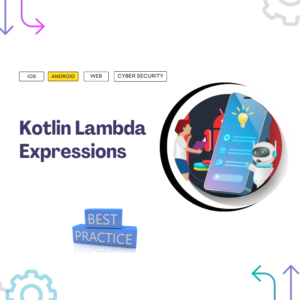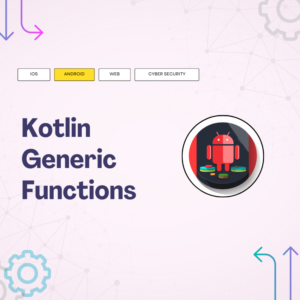Functional programming is a paradigm that’s gaining increasing popularity in modern software development. It emphasizes the use of functions as first-class citizens, enabling developers to write clean, concise, and maintainable code. In this article, we’ll explore the world of functional programming functions in Kotlin, focusing on Immutability, Pure Functions, Function Composition, and Functional Operators. We’ll use real-life scenarios, code examples, and detailed explanations to help you understand and apply these concepts effectively.

Table of Contents
1. Immutability
Immutability is a fundamental concept in functional programming. It means that once a data structure is created, it cannot be changed. In Kotlin, you can create immutable variables using the val keyword.
Real-life scenario: Imagine you’re building a shopping cart for an e-commerce app. You want to ensure that the cart’s total price remains constant once items are added.
fun main() {
val cartItems = listOf(20.0, 15.0, 30.0, 10.0) // Immutable list of item prices
val totalPrice = cartItems.sum() // Calculate the total price
println("Total Price: $$totalPrice")
}
Output: Total Price: $75.0
In this example, cartItems is immutable, and you can’t change its contents after creation.
2. Pure Functions
Pure functions are functions that produce the same output for the same input and have no side effects. They are essential for predictable and testable code.
Real-life scenario: Let’s calculate the sales tax using a pure function.
fun calculateSalesTax(amount: Double): Double {
val taxRate = 0.1 // 10% tax rate
return amount * taxRate
}
fun main() {
val itemPrice = 50.0
val salesTax = calculateSalesTax(itemPrice)
println("Sales Tax: $$salesTax")
}
Output: Sales Tax: $5.0
The calculateSalesTax function is pure because it always returns the same output for the same input.
3. Function Composition
Function composition involves chaining functions together to transform data step by step. This allows you to build complex operations from simpler ones.
Real-life scenario: Let’s create a function that calculates the total cost of an item, including tax.
fun calculateTotalCost(itemPrice: Double): Double {
val salesTax = calculateSalesTax(itemPrice)
return itemPrice + salesTax
}
fun main() {
val itemPrice = 50.0
val totalCost = calculateTotalCost(itemPrice)
println("Total Cost: $$totalCost")
}
Output: Total Cost: $55.0
Here, we’ve composed the calculateSalesTax and the addition operation to calculate the totalCost.
4. Functional Operators
Functional operators like map, filter, and reduce provide powerful tools for working with collections in a functional style.
Real-life scenario: Suppose you want to find the total price of discounted items.
fun main() {
val prices = listOf(20.0, 15.0, 30.0, 10.0)
val discountedPrices = prices.filter { it > 15.0 }
val totalDiscountedPrice = discountedPrices.sum()
println("Total Discounted Price: $$totalDiscountedPrice")
}
Output: Total Discounted Price: $50.0
In this example, we’ve used the filter function to select items with prices over $15, and then we calculated their sum.
Implementing Functional Programming Principles
Implementing functional programming principles or keeping them in mind while coding in Kotlin involves adopting certain practices and patterns. Here are some guidelines to help you incorporate functional programming principles into your coding:
- Use Immutability:
- Declare variables with
val(immutable) whenever possible. - Prefer immutable data structures and avoid mutable state.
- Declare variables with
- Write Pure Functions:
- Strive for functions that have no side effects and always produce the same output for the same input.
- Minimize reliance on external state and mutable variables within functions.
- Leverage Higher-Order Functions:
- Utilize functions as first-class citizens: pass functions as parameters and return functions from other functions.
- Explore and use higher-order functions from the Kotlin standard library (
map,filter,reduce, etc.).
- Functional Composition:
- Compose functions to create more complex behavior from simpler, reusable functions.
- Avoid deeply nested code by breaking down tasks into smaller functions.
- Immutable Collections:
- Use Kotlin’s immutable collections (
List,Set,Map) to encourage immutability in your data structures. - Leverage functional-style operations on collections (
map,filter,reduce, etc.) for concise and expressive code.
- Use Kotlin’s immutable collections (
- Pattern Matching:
- Leverage Kotlin’s
whenexpression for pattern matching to simplify conditional logic. - Use sealed classes and data classes to model data structures in a functional way.
- Leverage Kotlin’s
- Avoid Mutable State:
- Minimize the use of mutable variables and mutable state in your code.
- Consider alternatives like immutable data structures and functional programming techniques to handle state changes.
- Avoid Side Effects:
- Be mindful of side effects that modify external state.
- Encapsulate side effects, such as I/O operations, in a controlled manner, possibly using monads or functional constructs.
- Think Functionally:
- Shift your mindset to think in terms of transformations and computations rather than step-by-step imperative procedures.
- Aim for declarative and expressive code that describes what to achieve rather than how to achieve it.
- Learn from Functional Programming Paradigm:
- Read and practice examples of functional programming in Kotlin from reputable sources and community contributions.
By consistently applying these principles, you can gradually shift toward a more functional style of programming in Kotlin. Start with small steps, refactor existing code, and embrace functional programming concepts in new developments to improve code maintainability and reliability.

Interview Questions
Here are some interview questions related to functional programming with Kotlin, along with sample answers:
- What is functional programming, and how does it differ from imperative programming?Answer: Functional programming is a programming paradigm that treats computation as the evaluation of mathematical functions and avoids changing state and mutable data. It differs from imperative programming, which focuses on changing program state through statements.
- What are the core principles of functional programming?Answer: The core principles of functional programming are immutability (data cannot be changed after creation), pure functions (functions that have no side effects and return the same output for the same input), and function composition (chaining functions to create complex operations).
- Explain immutability in Kotlin and why it’s important in functional programming.Answer: Immutability in Kotlin is achieved by using the
valkeyword for variables, which makes them read-only after initialization. Immutability is important in functional programming because it ensures that data doesn’t change unexpectedly, making programs more predictable and easier to reason about. - What is a pure function, and why is it essential in functional programming?Answer: A pure function is a function that, given the same input, always produces the same output and has no side effects. It is essential in functional programming because it guarantees predictability, testability, and the absence of unexpected behavior in a program.
- What are some common functional operators in Kotlin, and how do they work?Answer: Common functional operators in Kotlin include
map,filter, andreduce. These operators work on collections (e.g., lists) to transform, filter, and reduce data. For example,mapapplies a function to each element of a list,filterselects elements based on a given condition, andreduceaggregates elements into a single result. - Explain the concept of currying in functional programming and how it’s used in Kotlin.Answer: Currying is the technique of converting a function that takes multiple arguments into a series of functions that each take one argument. In Kotlin, this can be achieved using lambda expressions and higher-order functions.
- What is tail recursion, and why is it important in functional programming?Answer: Tail recursion is a recursive function where the recursive call is the last operation in the function. It’s important in functional programming because it allows for efficient recursion without causing stack overflow errors. Kotlin supports tail recursion optimization using the
tailrecmodifier. - Explain the concept of pattern matching and how it can be used in Kotlin for functional programming.Answer: Pattern matching is a way to match complex data structures or objects against specific patterns. In Kotlin, pattern matching is achieved using sealed classes and when expressions, enabling elegant and readable code for handling different data cases in a functional style.
- What are some common use cases for functional programming in Kotlin, and when would you choose it over imperative programming?Answer: Common use cases for functional programming in Kotlin include data transformation, stream processing, and working with collections. You might choose functional programming over imperative programming when you need code that is more concise, maintainable, and has a reduced risk of bugs related to mutable state.
Feel free to follow and join my email list at no cost. Don’t miss out — sign up now!
Please check out my earlier blog post for more insights. Happy reading!
The Innovative Fundamentals of Android App Development in 2023
How to learn Android App Development in 2023 – Full Guide For Beginners using Kotlin Language
Ultimate Guideline on How to Use ViewModel Design Pattern
What is the Repository Pattern in Android? A Comprehensive Guide
What is ViewModel in Android? A Good Guide for Beginners
The Innovative Fundamentals of Android App Development in 2023
How to Say Goodbye to Activity Lifecycle and Say Hello to Compose Lifecycle ?
How to Monitor/Observe Network Availability for Android Projects
Exploring Sealed Class vs Enum in Kotlin Which is Best for Your Code?
What is the difference between Functional Programming and OOP?



